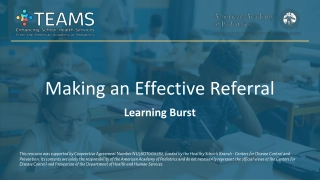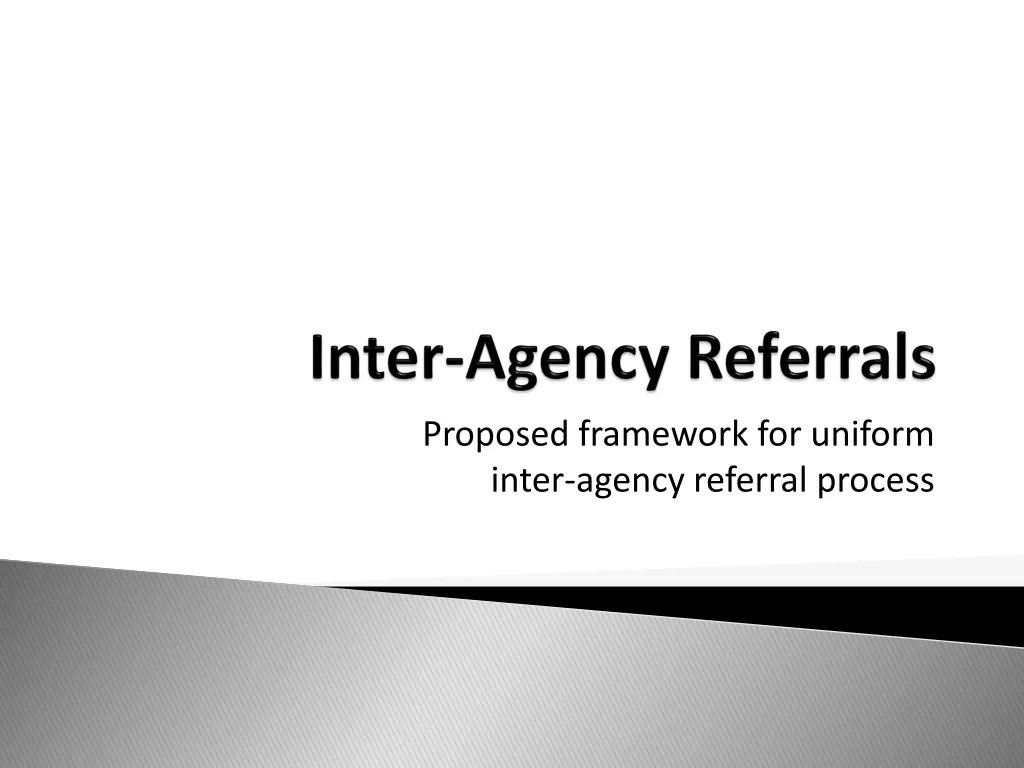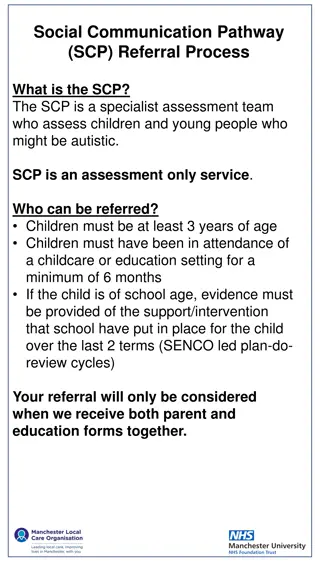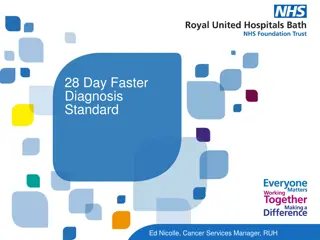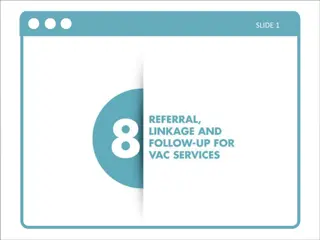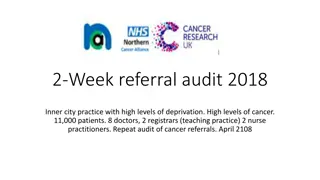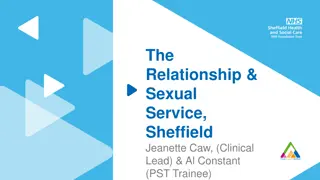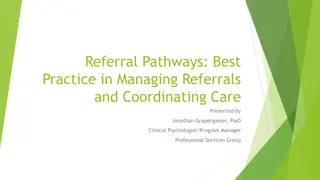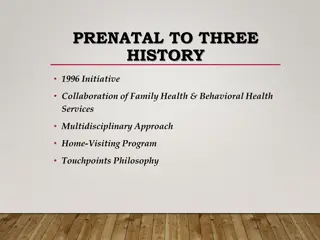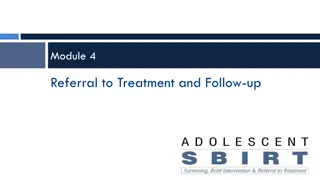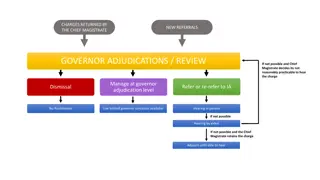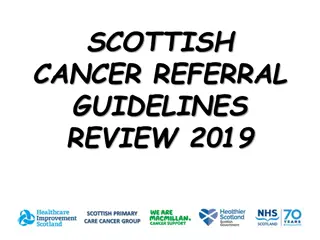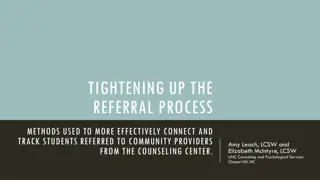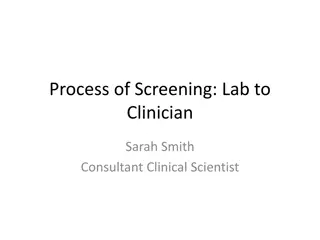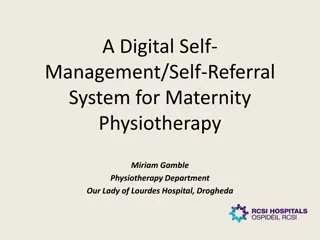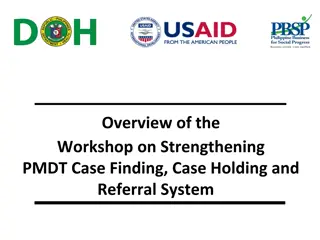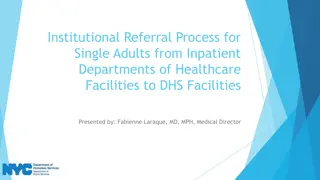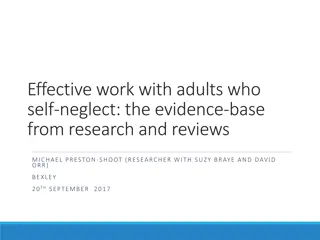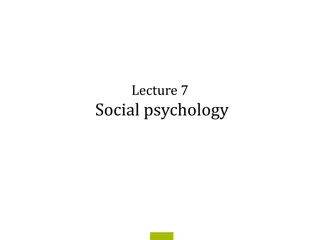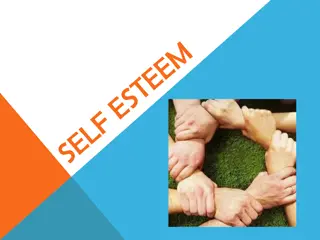Making an Effective Referral
Effective school-based referral for health services and formalizing the process. Learn to connect students to providers based on identified needs.
0 views • 19 slides
Guide to Effective Inter-Agency Referral Process
Learn about the proposed framework for a uniform inter-agency referral process aimed at directing clients to services beyond the expertise of their current provider. Understand when to make a referral, the essential steps involved, and the importance of follow-up to ensure clients receive needed ser
1 views • 18 slides
Pharmacy First Service for Uncomplicated UTIs in Women Aged 16-64 - November 2023
This pharmacy service aims to assess and treat uncomplicated urinary tract infections (UTIs) in women aged 16-64 years in community pharmacies. The service follows guidelines to promote self-care, aims to displace GP activities, and utilizes clinical skills of pharmacists for timely and appropriate
0 views • 17 slides
Understanding Self-Worth in Children: Building a Strong Foundation
Explore the importance of self-concept, self-esteem, and self-worth in children's development. Learn how parents can positively impact a child's self-perception and self-value through nurturing experiences. Discover the key sources influencing children's self-worth and the critical role of early lif
0 views • 30 slides
Cinapsis - Revolutionizing Eyecare with Electronic Referral System
Cinapsis is a cutting-edge healthcare technology company offering an Electronic Eyecare Referral System (EeRS) to digitize and streamline ophthalmology referrals. Their innovative platform enhances patient care by facilitating secure communication, guidance, and referrals among eyecare professionals
5 views • 15 slides
Gaming App Referral Program | Tirangagameonline.in
Play your favorite games on Tirangagameonline.in and earn prizes by signing up for our gaming app referral program. Don't pass up the advantages and pleasure!\n\n\/\/tirangagameonline.in\/
2 views • 1 slides
Understanding Self-Esteem: Meaning, Importance, and Types
Self-esteem is how we perceive our worth and value. High self-esteem leads to confidence and positivity, while low self-esteem can result in self-doubt and negative emotions. Self-esteem impacts mental health, behavior, decisions, relationships, and overall success in life. Recognizing and nurturing
2 views • 15 slides
Understanding Self-Esteem and Ways to Improve It
Self-esteem is our perception of ourselves, impacting how we navigate life. Healthy self-esteem fosters positivity, while low self-esteem can be detrimental. Various factors, like childhood experiences, contribute to low self-esteem, but steps can be taken to improve it. Building positive relationsh
0 views • 14 slides
Developing a Self-Care Action Plan for Overall Well-Being
Self-care involves deliberate activities to nurture mental, emotional, physical, and spiritual health, yet it is often neglected. This guide explores the essence of self-care, emphasizes the importance of building a personalized self-care action plan, and provides insights into taking care of your b
0 views • 19 slides
Step-by-Step Guide for Online Referral Portal in Quit Services
Access the online referral portal for quit services to refer patients effectively. Follow the detailed instructions for referral partners, including selecting the patient's state, searching for facilities and healthcare professionals, completing the referral form, and submitting it securely. Thank y
0 views • 9 slides
Understanding Referral to Treatment (RTT) Quality Standards
Referral to Treatment (RTT) Quality Standards, also known as RTT 18 Weeks, is a vital component of the NHS Constitution that guarantees patients a legal right to timely diagnosis and treatment within 18 weeks of referral. It encompasses various stages in a healthcare pathway, each assigned an RTT co
1 views • 12 slides
Social Communication Pathway (SCP) Referral Process
The Social Communication Pathway (SCP) is a specialist assessment team that evaluates children and young people who may be autistic. Referrals are accepted for children aged at least 3 years who have been attending a childcare or education setting for a minimum of 6 months. Assessments typically tak
0 views • 4 slides
Enhancing Emergency Obstetric and Newborn Care through First Referral Units
Historical background and strategic approach to improve emergency obstetric and newborn care through the establishment of fully functional First Referral Units (FRUs) in districts, focusing on critical services, infrastructure needs, and essential facilities. The initiative aims to provide 24-hour d
0 views • 24 slides
28 Day Faster Diagnosis Standard in Cancer Services
The 28 Day Faster Diagnosis Standard focuses on timely referral to definitive diagnosis for suspected cancer patients, enabling prompt treatment initiation or providing peace of mind. Key principles include starting the clock upon receipt of referral and ending it upon diagnosis communication or tre
0 views • 7 slides
Effective Referral Process in Child Protection Programs
Understanding the importance of an effective referral process in child protection programs is crucial. It ensures rapid access to services, prevents children from falling through the cracks, and reduces stress for service providers. Criteria and principles for setting up a good referral system are o
0 views • 9 slides
Enhancing Self-Confidence for Professional Success
Understanding the importance of self-confidence in the workplace is crucial for personal growth and career advancement. Self-confident individuals trust their abilities, maintain a sense of control over their lives, and have realistic expectations. This summary delves into the characteristics of sel
0 views • 13 slides
Cancer Referral Audit in High-Deprivation Inner City Practice
An audit of 2-week cancer referrals in a practice with high deprivation levels and cancer prevalence among 11,000 patients. The audit shows improvements in referrals, use of regional forms, and patient information on reasons for referral. It highlights the importance of accurate referral processes i
0 views • 11 slides
Rapid Investigation Service Overview
The Wessex RIS is a new cancer referral pathway aimed at patients with concerning non-specific symptoms. Working in partnership with acute trusts in Wessex, the service provides timely investigations to exclude cancer in such patients. Established as part of the National Rapid Diagnostic Centre proj
0 views • 15 slides
Psychosexual Service Overview in Sheffield
The Relationship & Sexual Service in Sheffield provides psychosexual interventions for individuals facing sexual difficulties. The service, led by Jeanette Caw and Al Constant, offers support for various sexual dysfunctions and relationship issues. Updated referral criteria, service eligibility, and
0 views • 14 slides
Understanding Greater Manchester Cancer: Referral, Assessment & Management for Suspected Sarcomas
This content provides comprehensive information on Greater Manchester Cancer referral and assessment for suspected soft tissue and bone sarcomas. It covers objectives, background, symptoms, signs, clinical assessment, initial management, and referral criteria. Essential guidelines and key points on
0 views • 26 slides
Best Practices in Referral Pathways for School-Based Mental Health Services
This presentation by Jonathan Grapengieser, a clinical psychologist and program manager, delves into the importance of effective referral pathways in managing and coordinating care for school-based mental health services. It highlights the need for streamlined processes, stakeholder involvement, and
1 views • 26 slides
How to Cancel a Referral Request Using UBRN
To cancel a referral request using UBRN, navigate to the patient tab, search using the UBRN, then on the Referral summary page, choose Cancel appointment from the Actions dropdown. Select a cancellation reason, add comments if needed, confirm the cancellation, and close the confirmation page.
0 views • 6 slides
Prenatal to Three History and Services Overview
The Prenatal to Three (PTT) initiative, established in 1996, focuses on a collaborative approach between family health and behavioral health services through a home-visiting program based on the Touchpoints philosophy. The program serves adult clients who are pregnant or within 12 months postpartum,
0 views • 22 slides
Adolescents Substance Use Treatment Referral and Follow-up
Explore the process of referring adolescents to substance use treatment, addressing challenges like confidentiality and push back. Understand treatment options, warm hand-offs, and the importance of follow-up. Discover suggested readings and data on adolescents admitted to substance abuse treatment,
1 views • 76 slides
Enhancing Self-Regulation for Formative Assessment through Social and Emotional Learning
Explore the significance of self-regulation in formative assessment, understand key concepts like self-control, emotional competence, and perseverance. Discover actionable strategies to implement self-regulation interventions with students and train other adults effectively. Future orientation and s
0 views • 25 slides
Understanding Mindful Self-Judgment and Its Role in Mental Health
Mindful self-judgment is a complex concept that involves balancing self-awareness and self-compassion. While nonjudgment is a key aspect of mindfulness practices, there is a debate on whether mindful self-judgment can be appropriate and functional in certain circumstances. Researchers like June Pric
2 views • 46 slides
Procedures and Criteria for Adjudication of Charges by Chief Magistrate
The process of adjudicating charges returned by the Chief Magistrate involves detailed steps, including review by the governor adjudication level and independent adjudicator referral. Factors such as procedural fairness, evidence quality, and seriousness of the charge are considered. If a charge is
0 views • 5 slides
Understanding Self-Esteem: Highs and Lows
Self-esteem is the judgment we hold about ourselves, shaped by experiences and relationships. High self-esteem individuals embrace new encounters with confidence and positivity, while low self-esteem individuals struggle with self-doubt and criticism. Recognizing signs of low self-esteem is crucial
0 views • 11 slides
Scottish Cancer Referral Guidelines Review 2019
The Scottish Cancer Referral Guidelines were reviewed in 2019 by multidisciplinary subgroups. Changes were made in various cancer sections, while keeping some sections unchanged. The review aimed to incorporate new evidence and ensure timely and appropriate referrals, prioritizing Urgent Suspicion o
0 views • 58 slides
Enhancing Student Referral Process in College Counseling Centers
Exploring strategies to improve the referral process from college counseling centers to community providers for more effective student support. Topics include challenges of off-campus referrals, referral coordination programs, assessment models, and best practices. The program involves 30-minute ses
0 views • 12 slides
Efficient Baby Screening and Referral Process Overview
Detailed overview of the screening process from sample collection to clinician consultation, including timelines, referral pathways, and confirmation procedures for preterm babies. Lab turnaround times, repeat sample guidelines, and referral process details are also covered.
0 views • 19 slides
School and Community-based Counseling Services: Supporting Students and Families
A collaborative partnership between school districts and Southwest Behavioral & Health Services offers counseling and support services to students and families. Eligible for services are all students and their families, with funding from various sources. Referrals can be made by school administrator
0 views • 11 slides
Boosting Your Child's Self-Esteem & Confidence in Parenting Workshop Series
Understanding self-esteem in children is crucial for their emotional development. Healthy self-esteem leads to positive behaviors, while low self-esteem can result in negative self-perceptions. Recognizing signs of healthy and unhealthy self-esteem allows parents to support and nurture their child's
0 views • 11 slides
Digital Self-Referral System for Maternity Physiotherapy
Maternity physiotherapy department implements an online self-referral system for patients, providing easy access to educational videos and personalized care, resulting in more efficient use of clinical time, quicker access to treatment, and positive impacts on both patients and healthcare staff.
0 views • 4 slides
Strengthening PMDT Case Finding Workshop Overview
In the Workshop on Strengthening PMDT Case Finding, Case Holding, and Referral System, the focus is on improving the management of MDR-TB cases to prevent transmission, XDR-TB development, and deaths. The program aims to enhance the detection and quality care of MDR-TB cases, ensuring treatment comp
0 views • 10 slides
Institutional Referral Process for Single Adults from Inpatient Departments to DHS Facilities
This presentation outlines the institutional referral process for single adults from inpatient departments of healthcare facilities to DHS facilities, focusing on screening referrals, coordinating care for medically appropriate individuals, and improving health outcomes. It covers goals, the shelter
0 views • 51 slides
Understanding Self-Neglect in Adults: Challenges and Research Insights
This content delves into the complex issue of self-neglect in adults, covering its definition, key challenges, and the research evidence available. It explores the various aspects of self-neglect, including neglect of self-care, domestic environment, and refusal of services. The challenges associate
0 views • 39 slides
Understanding the Self in Social Psychology
Delve into the concept of the individual and the self in social psychology, exploring how identities have evolved historically and the distinction between collective and individual selves. Learn about self-awareness, Wundt's differentiation of I and me, and Higgins' self-discrepancy theory, shedding
0 views • 84 slides
Enhancing Care Coordination for Improved Patient Referral Experiences
Explore the importance of patient-centered referral experiences, highlighting the impact of effective care coordination on patient outcomes. Contrasting cases illustrate the difference between non-patient-centered and patient-centered referral processes. Learn actionable steps to ensure all stakehol
0 views • 52 slides
Boosting Self-Esteem: Benefits and Tips for Improvement
Understanding self-esteem, its benefits, and risks of low self-esteem are essential for personal growth. Developing high self-esteem can lead to increased self-respect, goal achievement, and willingness to try new things. On the other hand, low self-esteem can make individuals vulnerable to peer pre
0 views • 10 slides
